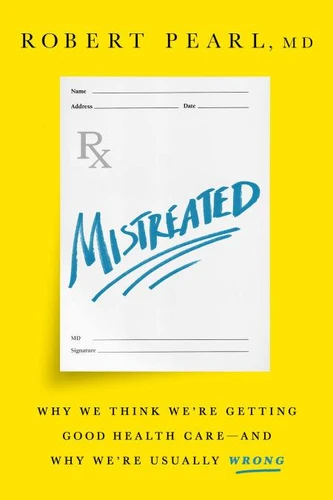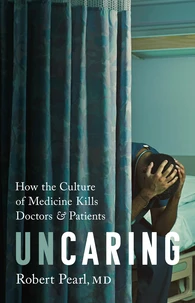Mistreated. Why We Think We're Getting Good Health Care -- and Why We're Usually Wrong
Par :Formats :
Disponible dans votre compte client Decitre ou Furet du Nord dès validation de votre commande. Le format ePub protégé est :
- Compatible avec une lecture sur My Vivlio (smartphone, tablette, ordinateur)
- Compatible avec une lecture sur liseuses Vivlio
- Pour les liseuses autres que Vivlio, vous devez utiliser le logiciel Adobe Digital Edition. Non compatible avec la lecture sur les liseuses Kindle, Remarkable et Sony
- Non compatible avec un achat hors France métropolitaine
 , qui est-ce ?
, qui est-ce ?Notre partenaire de plateforme de lecture numérique où vous retrouverez l'ensemble de vos ebooks gratuitement
Pour en savoir plus sur nos ebooks, consultez notre aide en ligne ici
- Nombre de pages336
- FormatePub
- ISBN978-1-61039-766-7
- EAN9781610397667
- Date de parution01/05/2017
- Protection num.Adobe DRM
- Infos supplémentairesepub
- ÉditeurPublicAffairs
Résumé
The biggest problem in American health care is us Do you know how to tell good health care from bad health care? Guess again. As patients, we wrongly assume the "best" care is dependent mainly on the newest medications, the most complex treatments, and the smartest doctors. But Americans look for health-care solutions in the wrong places. For example, hundreds of thousands of lives could be saved each year if doctors reduced common errors and maximized preventive medicine.
For Dr. Robert Pearl, these kinds of mistakes are a matter of professional importance, but also personal significance: he lost his own father due in part to poor communication and treatment planning by doctors. And consumers make costly mistakes too: we demand modern information technology from our banks, airlines, and retailers, but we passively accept last century's technology in our health care.
Solving the challenges of health care starts with understanding these problems. Mistreated explains why subconscious misperceptions are so common in medicine, and shows how modifying the structure, technology, financing, and leadership of American health care could radically improve quality outcomes. This important book proves we can overcome our fears and faulty assumptions, and provides a roadmap for a better, healthier future.
For Dr. Robert Pearl, these kinds of mistakes are a matter of professional importance, but also personal significance: he lost his own father due in part to poor communication and treatment planning by doctors. And consumers make costly mistakes too: we demand modern information technology from our banks, airlines, and retailers, but we passively accept last century's technology in our health care.
Solving the challenges of health care starts with understanding these problems. Mistreated explains why subconscious misperceptions are so common in medicine, and shows how modifying the structure, technology, financing, and leadership of American health care could radically improve quality outcomes. This important book proves we can overcome our fears and faulty assumptions, and provides a roadmap for a better, healthier future.
The biggest problem in American health care is us Do you know how to tell good health care from bad health care? Guess again. As patients, we wrongly assume the "best" care is dependent mainly on the newest medications, the most complex treatments, and the smartest doctors. But Americans look for health-care solutions in the wrong places. For example, hundreds of thousands of lives could be saved each year if doctors reduced common errors and maximized preventive medicine.
For Dr. Robert Pearl, these kinds of mistakes are a matter of professional importance, but also personal significance: he lost his own father due in part to poor communication and treatment planning by doctors. And consumers make costly mistakes too: we demand modern information technology from our banks, airlines, and retailers, but we passively accept last century's technology in our health care.
Solving the challenges of health care starts with understanding these problems. Mistreated explains why subconscious misperceptions are so common in medicine, and shows how modifying the structure, technology, financing, and leadership of American health care could radically improve quality outcomes. This important book proves we can overcome our fears and faulty assumptions, and provides a roadmap for a better, healthier future.
For Dr. Robert Pearl, these kinds of mistakes are a matter of professional importance, but also personal significance: he lost his own father due in part to poor communication and treatment planning by doctors. And consumers make costly mistakes too: we demand modern information technology from our banks, airlines, and retailers, but we passively accept last century's technology in our health care.
Solving the challenges of health care starts with understanding these problems. Mistreated explains why subconscious misperceptions are so common in medicine, and shows how modifying the structure, technology, financing, and leadership of American health care could radically improve quality outcomes. This important book proves we can overcome our fears and faulty assumptions, and provides a roadmap for a better, healthier future.




